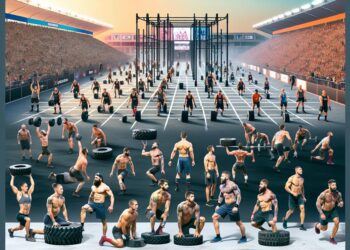Did you know that nutrition plays a crucial role in enhancing your CrossFit performance? In fact, studies have shown that athletes who fuel their bodies with the right nutrients experience improved strength, endurance, and recovery. But what exactly does it take to optimize your nutrition for CrossFit? In this discussion, we will explore the importance of macros, pre-workout nutrition strategies, post-workout recovery foods, hydration, and the role of nutritional supplements in fueling your performance. So, if you're ready to take your CrossFit game to the next level, let's dive into the world of CrossFit nutrition and discover how you can fuel your body for success.
Key Takeaways
- Tracking macros is essential for optimizing CrossFit nutrition and enhancing athletic performance
- Prioritize consuming a meal or snack containing carbohydrates and protein 1-3 hours before CrossFit workouts
- Consuming carbohydrates and protein within 30 minutes to an hour after a workout aids in muscle repair and replenishing energy stores
- Hydration is crucial for optimal CrossFit performance, so drink water before, during, and after workouts and monitor hydration status by assessing urine color
The Importance of Macros
Understanding the importance of macros is crucial for optimizing your CrossFit nutrition and maximizing your athletic performance. Macros, short for macronutrients, are the three main components of our diet: carbohydrates, proteins, and fats. Achieving a balanced diet that includes the right proportion of these macros is essential for fueling your body and supporting your workouts.
Tracking macros allows you to have a clear understanding of your nutrient intake and make necessary adjustments to meet your fitness goals. Each macronutrient plays a specific role in your body. Carbohydrates are the primary source of energy and fuel your intense workouts. Proteins aid in muscle repair and growth, helping you recover and build strength. Fats provide long-lasting energy and support various bodily functions.
To track your macros effectively, start by determining your daily calorie needs based on your activity level and goals. Then, divide those calories among the three macros, aiming for a balanced distribution. Utilize food tracking apps or journals to monitor your macro intake accurately.
Pre-Workout Nutrition Strategies
To optimize your performance during CrossFit workouts, it is important to fuel your body with the right nutrients through effective pre-workout nutrition strategies. The timing of your pre-workout meal is crucial to ensure that you have enough energy to power through your training session. Ideally, you should consume a meal or snack containing carbohydrates and protein about 1-3 hours before your workout.
When it comes to pre-workout meal ideas, you want to focus on foods that are easily digestible and provide a steady release of energy. Some options include a banana with almond butter, Greek yogurt with berries, or a turkey and avocado wrap. These meals provide a good balance of carbohydrates, protein, and healthy fats to fuel your muscles and support optimal performance.
Timing is key when it comes to pre-workout nutrition. Eating too close to your workout can leave you feeling sluggish and may cause digestive issues. On the other hand, if you eat too far in advance, you may feel hungry and lack energy during your workout. Experiment with different timing strategies to find what works best for you, but aim to have your pre-workout meal or snack about 1-3 hours before training.
Post-Workout Recovery Foods
After fueling your body with the right nutrients through effective pre-workout nutrition strategies, it is important to focus on consuming post-workout recovery foods that will aid in muscle repair and replenish energy stores. Proper nutrition after your CrossFit workout is crucial for optimizing recovery and supporting your performance goals.
One key aspect of post-workout nutrition is replenishing electrolytes. Electrolytes are minerals such as sodium, potassium, and magnesium that are lost through sweat during exercise. They play a vital role in maintaining fluid balance, muscle function, and nerve transmission. Consuming foods or beverages that are rich in electrolytes can help restore these essential minerals and prevent dehydration. Some examples of electrolyte-rich foods include coconut water, bananas, and leafy green vegetables.
In addition to electrolytes, the timing of your post-workout meal is also important. Consuming a combination of carbohydrates and protein within 30 minutes to an hour after your workout can help enhance muscle recovery and glycogen replenishment. Carbohydrates provide the energy needed to restore glycogen stores, while protein supplies the amino acids necessary for muscle repair and growth. Aim for a balanced meal that includes sources of both carbohydrates and protein, such as a turkey and avocado wrap or a protein shake with added fruits.
To summarize, post-workout recovery foods play a crucial role in replenishing electrolytes, restoring glycogen stores, and promoting muscle repair. Be sure to consume a combination of carbohydrates and protein within the recommended time frame to optimize your recovery and fuel your future workouts.
Hydration for Optimal Performance
Are you hydrating properly to optimize your performance during CrossFit workouts? Hydration is a crucial aspect of athletic performance, and maintaining adequate fluid balance is essential for optimal CrossFit performance. Here are five hydration strategies to help you stay hydrated and perform at your best:
- Drink water before, during, and after your workout: Start hydrating before your workout by drinking water throughout the day. During your CrossFit session, sip on water regularly to replace fluids lost through sweat. Afterward, continue to hydrate to replenish your fluid levels.
- Monitor your urine color: Monitoring the color of your urine is a simple way to assess your hydration status. Aim for pale yellow urine, indicating adequate hydration. Dark yellow urine suggests dehydration and the need to increase fluid intake.
- Maintain electrolyte balance: Electrolytes, such as sodium and potassium, are essential for proper hydration. Include electrolyte-rich foods like bananas, avocados, and coconut water in your diet to maintain electrolyte balance.
- Consider sports drinks for intense workouts: During extended and intense CrossFit workouts, sports drinks can be beneficial. They provide both carbohydrates and electrolytes to fuel your muscles and aid in hydration.
- Personalize your hydration plan: Everyone's hydration needs are different. Experiment with different strategies, monitor how your body responds, and adjust accordingly to find the hydration plan that works best for you.
Nutritional Supplements for CrossFit

Maintaining proper hydration is just one aspect of optimizing your performance in CrossFit, and another important factor to consider is the role of nutritional supplements. While a well-balanced diet should provide most of the nutrients your body needs, there are specific supplements that can support your recovery and enhance your performance.
Recovery supplements play a crucial role in helping your body bounce back after intense workouts. Protein supplements, such as whey protein or plant-based options like pea or rice protein, can aid in muscle repair and growth. Branched-chain amino acids (BCAAs) are another popular choice, as they can reduce muscle soreness and promote faster recovery.
Performance enhancers are also worth considering, but it's important to approach them with caution. Creatine monohydrate, for example, has been shown to improve strength and power output in high-intensity exercises like lifting weights or sprinting. Beta-alanine can increase endurance by buffering lactic acid buildup in muscles.
Before incorporating any supplements into your routine, it's essential to consult with a healthcare professional or registered dietitian. They can help determine which supplements may be beneficial for you based on your individual needs and goals.
Frequently Asked Questions
How Many Calories Should I Consume per Day to Support My Crossfit Training?
To support your CrossFit training, you should consume the right amount of calories per day. It's important to find the balance that works for you, considering your activity levels and goals. Macronutrient distribution is also crucial for optimal performance.
What Are Some Good Sources of Protein for a Crossfit Athlete?
You can fuel your CrossFit performance with high protein snacks like Greek yogurt or protein bars. For pre and post workout protein options, consider lean meats like chicken or fish. These choices can aid in muscle recovery and growth.
Can I Still Follow a Vegetarian or Vegan Diet and Meet My Nutritional Needs for Crossfit?
Yes, you can still follow a vegetarian or vegan diet and meet your nutritional needs for CrossFit. There are plenty of vegetarian options for pre-workout meals and vegan protein powder alternatives available to fuel your performance.
Are There Any Specific Foods or Supplements That Can Help With Muscle Recovery and Reduce Post-Workout Soreness?
To help your muscles recover and reduce post-workout soreness, certain foods and supplements can be beneficial. Hydration also plays a crucial role in post-workout recovery. Incorporate these strategies into your routine for optimal results.
How Can I Ensure I Am Getting Enough Micronutrients, Such as Vitamins and Minerals, in My Crossfit Diet?
To ensure you're getting enough micronutrients in your CrossFit diet, it's important to understand their importance and be aware of potential nutritional deficiencies. Focus on a balanced diet with plenty of fruits, vegetables, and whole grains to meet your needs.
Conclusion
So, there you have it! Fueling your body with the right nutrition is crucial for optimal performance in CrossFit. Remember to focus on your macros, choose the right pre-workout snacks, prioritize post-workout recovery foods, and stay hydrated throughout your training. And if you're looking for an interesting statistic to motivate you, did you know that a study found that athletes who consumed a balanced diet had 10% faster recovery times? So, make sure to fuel your body properly and see the difference it can make in your performance!













